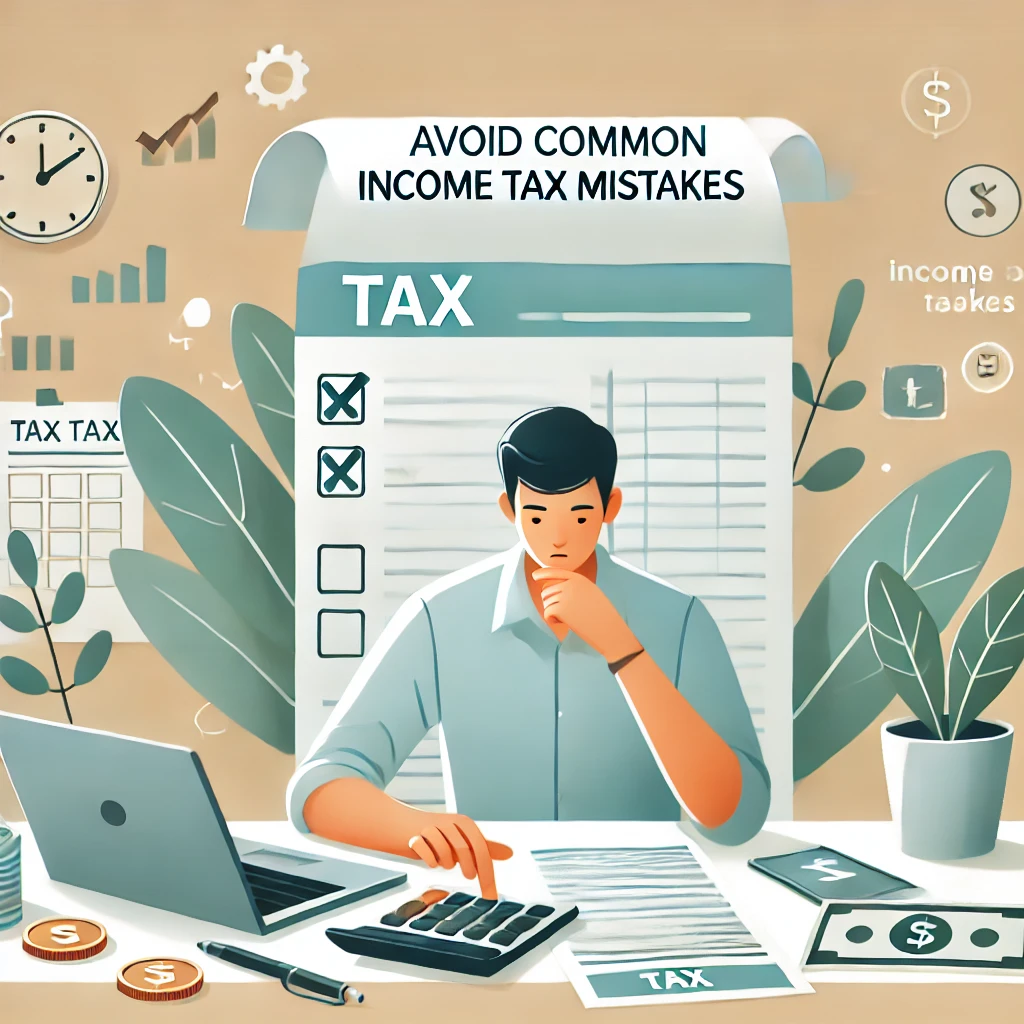Everyone seems to agree that paying taxes is a boring responsibility, but there isn’t much for a person to look forward to when they become an adult and paying your Income Tax Payment is surely unsettling. Although this seems like a simple procedure, there are many mistakes that can leave a person anxious or even cost him a penalty.
Therefore some of the major errors that arise with the tax payment process as well as some strategies to alleviate them will be discussed.
1. Turning the Financial Year (FY) into Assessment Year (AY) by Mistake
One of the most common mix-Ups is when a person mistakes a financial year (FY) for an Assessment year (AY). The two are closely related to each other since the FY is the year in which one makes money when benefiting, and the AY is when the available income gets taxed and evaluated. For instance, income earned from April 1, 2023, to March 31, 2024, falls within the scope specified in AY 2024–25, which further suggests that the taxes of that year are to be paid in 2024. so, When making a tax-related payment, it is important to use the correct AY.
The good news is that reviewing this easily overlooked detail can help to clear up any ambiguities.
2. Mistakes in Birth Year (BI) Information
All the problems that hinge on taxes are a major cause of discomfort, so it is a good practice to avoid switching Birth year with Permanent Account Number (BI).
An individual’s income tax records are inextricably bound to their PAN. In the course of any transaction, their non-congruence may result in the transaction payments being remitted to the wrong account or delays on the account of remittances. It is necessary to ensure that the PAN submitted for a payment corresponds to the one that is on one’s income tax profile. In case there are any discrepancies, it is Ideal to first take care of them as it will ensure that the linking of all the aspects is perfect.
3. Choosing Wrong Category of Tax Payment.
When it comes to identifying the payment category, most taxpayers become perplexed. The complexities that arise from poor selection can be avoided by selecting among advance tax, self-assessment tax and tax on regular assessment judiciously. All categories have specific reasons and events when it is utilized, for example, owing tax after return is filed, or making an estimated quarterly tax based on income expected during the quarter. It is abusive not to know which category pertains to one’s case as it turns out disastrous during the tax return filing. Take a few minutes to scan through the guidelines to confirm that you fall within the appropriate category so that mismatches do not occur.
4. Failing to Keep the Challan Receipts after Payment
This will sound very simple but not keeping the challan receipt after making payment in cash or online would endanger the individual in the future.
The receipt you received after making a payment is necessary when claiming your return. Should you fail to have this receipt, you’ll encounter challenges reconciling your taxes paid or worse, evidence of your payment may not be recorded. You are advised to always keep a digital or print copy of the payment receipt as it acts as a confirmation to the transaction.
5. Failing to Pay Expecting Tax Quaterly
In the event that you have other income sources aside from your salary, such as investment income or earnings from business ventures, you may need to pay your expected tax in 4 Instalments. This can be easily overlooked especially if this is your first time. You stand the risk of getting charged interest should you miss an instalment in 4 due dates and as stated in the penalty sections 234B and 234C of the income tax law. Try to take note of your income figures at all times, so plan for each quarter. The due dates for this payment can be set in a calendar or you can discuss the calendar with a tax consultant so you can make the payments on time.
6. Tax Reported Vs Tax Paid
While filing out your tax return, you have to be careful that the figure you put in the box does not exceed the amount of tax owed.
If you happen to mix up the recording of official documents during the tax filing process, you can expect to receive a slew of notifications from the tax office, which is likely going to be quite a nuisance to deal with. You can, however, avoid such issues by carefully verifying your payment information before submitting your return. A fault in such information can potentially result in fines or even an audit being worse than that. In order to curb this particular problem from happening, try your best to keep a sound record of all payments done, and cross reference them with the figures that you seek to claim when you are filing your taxes to ensure that they match.
7. Being Late to Pay Your Taxes
Sometimes, it is in human nature to leave tasks including filing taxes until the very last moment, however, such behavior, especially when combined with filing your taxes, will cost you an immense amount of money. Being late in making payments will create not only one problem but many more, such as incurring interest and adding additional penalties, all of which only serve as reminders to bring even more annoyance in the process. If you wish to avoid altering your payment plans, do it proactively instead and set up a schedule for submitting the payments when they are due and not after. Remind yourself a couple of days before the pay date so you can go through everything one last time to ensure that there are no mistakes. The sooner you file the payment, the less difficult it will be for you to deal with it later because at the end of the day, the bills would have already been taken care of.
8. Not Using Verified Apps that can Actually make Payments through them
Never use unverified applications or web based sites that offer simple payments while also being in the Income Tax Department websites.
It can be tempting to pay for a third party site, but be warned – a transaction may fail, or you may become a fraud victim. In order to protect yourself from risks such as these, you are advised to stay within the stated boundaries.
9. The process of figuring out how tax is calculated is not comprehended.
One of the most important challenges is not knowing how much tax to pay. It’s possible that taxable income may not have reported accurately, leading to underpayment, or not presented a comprehensive enough accounting of needed deductions.
Preventive principles suggest that tax payers should work out their income tax by working out every stream of income and all possible deductions from section 80C, 80D or other sections, for example. Should you still have concerns, take advice from a tax professional in order to avoid issues of suffering an under or over payment.
10. People do not document their old payments and other tax returns.
Although this can sound trivial but failing to track the history of your previous tax returns while filing for yours can cause complications. If you are making tax payments over some time or adjusting your tax payments during the year, it is essential to record every detail.
This will make the procedures regarding your filing easier and will eliminate problem such as paying the same tax several times.
Conclusion
There are so many payments that you make in life, and income tax certainly is not one of the most exciting ones but it does not have to be a chore. If one is meticulous when preparing taxes, such as double checking their PAN, selecting the right payment category and paying taxes on or before the due date, one can ease the stress associated with info tax filing.
Always make back up, check the numbers, and if any potential doubts arise, do not hesitate to consult professionals. For some individuals, being organized allows them to have only one additional reminder to remember: their health is the tax that takes care of themselves.
Attempting to avoid these mistakes will keep you from paying taxes in order to fulfill your dream and avoid any unpleasant penalties.



